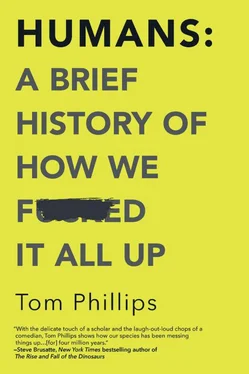Tom Phillips - Humans - A Brief History of How We F*cked It All Up
Здесь есть возможность читать онлайн «Tom Phillips - Humans - A Brief History of How We F*cked It All Up» весь текст электронной книги совершенно бесплатно (целиком полную версию без сокращений). В некоторых случаях можно слушать аудио, скачать через торрент в формате fb2 и присутствует краткое содержание. Город: Toronto, Год выпуска: 2019, ISBN: 2019, Издательство: Hanover Square Press, Жанр: История, Юмористические книги, на английском языке. Описание произведения, (предисловие) а так же отзывы посетителей доступны на портале библиотеки ЛибКат.
- Название:Humans: A Brief History of How We F*cked It All Up
- Автор:
- Издательство:Hanover Square Press
- Жанр:
- Год:2019
- Город:Toronto
- ISBN:978-1-48805-113-5
- Рейтинг книги:4 / 5. Голосов: 1
-
Избранное:Добавить в избранное
- Отзывы:
-
Ваша оценка:
- 80
- 1
- 2
- 3
- 4
- 5
Humans: A Brief History of How We F*cked It All Up: краткое содержание, описание и аннотация
Предлагаем к чтению аннотацию, описание, краткое содержание или предисловие (зависит от того, что написал сам автор книги «Humans: A Brief History of How We F*cked It All Up»). Если вы не нашли необходимую информацию о книге — напишите в комментариях, мы постараемся отыскать её.
Humans: A Brief History of How We F*cked It All Up — читать онлайн бесплатно полную книгу (весь текст) целиком
Ниже представлен текст книги, разбитый по страницам. Система сохранения места последней прочитанной страницы, позволяет с удобством читать онлайн бесплатно книгу «Humans: A Brief History of How We F*cked It All Up», без необходимости каждый раз заново искать на чём Вы остановились. Поставьте закладку, и сможете в любой момент перейти на страницу, на которой закончили чтение.
Интервал:
Закладка:
It isn’t necessarily the job of historians to make moral judgments on the past. They seek to uncover, to describe and to contextualize; to understand and explain how lives long past were lived; and to trace the intertwining webs of power and conflict that gave rise to the world we live in today. You can do all that without passing comment on whether those things were virtuous or wicked. Indeed, given the headache-inducing complexity of it all, it’s rarely a simple job to get all judgy about the past.
Fortunately, getting all judgy about the past is exactly the job of this book, so let’s quickly clarify something: colonialism was bad. Really, really bad.
How bad, exactly? Well, one estimate of the deaths from European colonialism in the twentieth century alone puts the figure in the region of 50 million, placing it up there with the crimes of Hitler, Stalin and Mao—and that’s in the century that colonial empires were collapsing. In the hundred years or so following the colonization of the Americas, a fairly conservative estimate is that 90 percent of the continent’s population died from a combination of disease, violence and forced labor—again, a figure in the tens of millions. The only reason we can’t be more specific is because it’s hard to work out how many people were living there before; we literally don’t know what we lost.
Of course, the death toll alone, awful as it is in its vagueness, doesn’t tell the full story. The African slave trade, the invention of the concentration camp, sexual slavery in the Japanese empire, the Spanish encomienda system in the Americas (where conquistadors were personally awarded work gangs of native people, like start-up employees being given human stock options)—the list of horrors is long and almost unbearably grim. And you can add to that the myriad cultures wiped out, the history destroyed and the vast illegitimate transfer of wealth from one part of the world to another, which is still evident in the relative prospects and comfort you’re likely to enjoy today depending on which bit of the world you were born in.
Like I said. Bad. This bit of the book isn’t very funny, sorry.
All of this probably shouldn’t even need saying, but we’re currently in the middle of a rather intense Colonialism Was Actually Good backlash, so here we are. The argument, briefly, is that the benefits of colonialism for the colonized and their descendants—the modernization of their economies, the building of infrastructure, the transfer of scientific and medical knowledge, the introduction of the concept of the rule of law—outweigh the regrettable mistakes that were made. But however you dress it up, this still effectively boils down to a claim that the colonized peoples were fundamentally uncivilized —incapable of self-governance, immune to progress and insufficiently advanced to utilize their natural resources appropriately. They were just sitting on all this gold, poor idiots, with no idea what to do with it.
For starters, this rests more on myths about the state of precolonial societies than it does on facts, and it inflates a few countries’ historically temporary and highly contingent superiority in military technology into some sort of immutable moral law of Who Should Be Allowed to Run Things. What’s more, it relies on the unspoken assumption that without colonization, the rest of the world would have simply remained in stasis for the past five centuries, or that there was no conceivable way—other than marching into a country and claiming it as your own—that people could possibly exchange scientific or technical knowledge across borders. Without all that generous colonization, the implication is that they’d still be stuck somewhere in the 1600s. Now that seems unlikely, especially given the transnational exchange of ideas that led to Europe’s run of technological advances in the first place, but of course it’s impossible to prove one way or the other because there simply aren’t enough countries in the world that were neither colonized nor colonizers for us to check. There’s Thailand, which almost alone managed to escape. I just googled and it turns out they do actually have electricity in Thailand, so on a sample size of one I suspect this argument might be bollocks.
But ultimately, this is all talking at cross-purposes, because waiting for several hundred years to pass and then doing a sort of retrospective cost–benefit analysis of your actions is not actually how humans generally distinguish right from wrong. That seems more like an after-the-fact attempt to justify what you already want to believe. As a result, the conversation about colonialism tends to involve two people shouting, “But trains!” and “Yes, but also the Amritsar Massacre!” at each other repeatedly, until everybody loses the will to live. (For the record, no, trains are not a moral counterweight to massacres, and I say that as someone who really likes trains.)
None of this involves saying that colonialism is responsible for every ill in the world, which it isn’t; or that before the arrival of the colonizers, the societies they would colonize were all blissful oases of peace and comity where everyone lived in harmony with nature, which they weren’t. I hope by now in the book it’s evident that the capacity for being dumb and awful has been pretty common across world history. It just means that as a species we should probably try to think about our past on the basis of what actually happened, rather than a vague nostalgic yearning for uncomplicated narratives about the glories of empire.
To take just one example: the idea that colonialism brought enlightened governance and enshrined the rule of law in the colonized countries doesn’t really square with the history of the numerous treaties signed between colonial powers and indigenous peoples—a history that doesn’t exactly scream “respect for the rule of law.” That notion would be a surprise to, say, the Native American nations who signed hundreds of treaties with the British and then American governments, only to see every one of them broken and their land taken from them. It would be a surprise to the Maori who signed the Treaty of Waitangi, where a series of translation errors between the English and Maori versions of the text led to some rather convenient ambiguity about exactly what had been signed away. It would be a surprise to the Xhosa people who lived in the southern African colony of British Kaffraria (yes, they literally named the territory after a racial slur for black people), who in 1847 were forced to watch as the newly installed governor, Sir Henry Smith, laughed as he symbolically tore up a peace treaty in front of their eyes, then forced their leaders to come forward one by one and kiss his boots.
Those aren’t metaphors by the way. He literally did that. It’s worth noting that British history generally remembers Sir Henry Smith as a dashing and heroic figure, one who was immortalized in a popular romantic novel depicting his fairy-tale marriage to [checks notes] a 14-year-old girl.
This all drags us back to one of the themes of this book: our deep and consistent ability to fool ourselves with stories and delusions about what it is we’re actually doing. Maintaining an empire requires active and ongoing efforts to mythologize its present and to misremember its past. This dissonance was in place right from the start: it’s why Columbus’s writing shows he firmly believed he was doing the Lord’s work in spreading the Christian faith at the very same moment he was mentally weighing up the Taíno’s potential for subjugation and servitude. It’s also why the British systematically destroyed tens of thousands of their own colonial records as they left Africa at the end of the imperial age, literally burning them and hurling them into the sea en masse in an effort to erase history and institute a collective amnesia. (In Uganda, this was given the very on-the-nose name of “Operation Legacy.”)
Читать дальшеИнтервал:
Закладка:
Похожие книги на «Humans: A Brief History of How We F*cked It All Up»
Представляем Вашему вниманию похожие книги на «Humans: A Brief History of How We F*cked It All Up» списком для выбора. Мы отобрали схожую по названию и смыслу литературу в надежде предоставить читателям больше вариантов отыскать новые, интересные, ещё непрочитанные произведения.
Обсуждение, отзывы о книге «Humans: A Brief History of How We F*cked It All Up» и просто собственные мнения читателей. Оставьте ваши комментарии, напишите, что Вы думаете о произведении, его смысле или главных героях. Укажите что конкретно понравилось, а что нет, и почему Вы так считаете.












